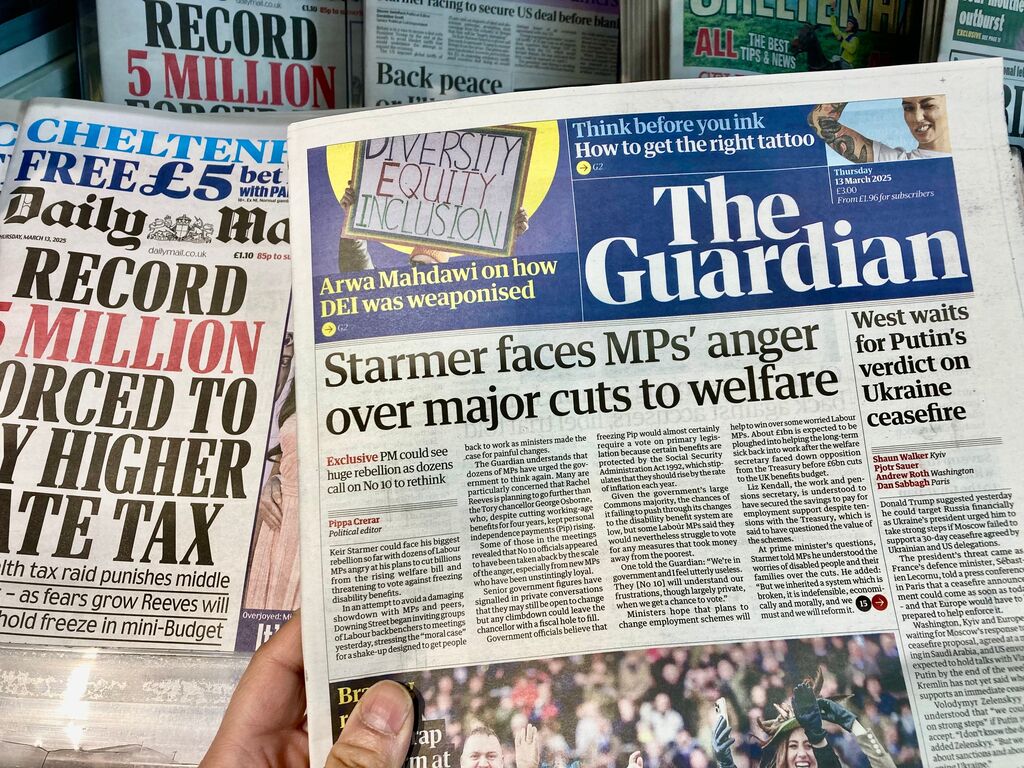Keir Starmer’s Welfare cuts: how to live in a world of tough choices

I still remember the conversation I had back when I was at university with a fellow-student who was trying to argue that voting for the Conservatives was immoral because of what he saw as their disregard for the poor and the vulnerable; I protested in defence, ‘It’s not that the Conservatives don’t care about the poor!’ He doubled down and told me how I was wrong, and how things like Universal Credit showed that the Tories were evil...
Now of course, students are often prone to have particularly strong views (I subsequently found out that the person in question was actually an ardent defender of Communism!). But there are few subjects more contentious than welfare reform. Raise concerns about the ballooning costs and you’ll be dismissed as heartless. Want more money for the most vulnerable? You must believe in a Magic Money tree.
But it’s a conversation which is only going to become more prevalent in the years to come.
We all know that the UK has an increasingly ageing population, and that birth rates are falling: spending on pensioner benefits will rise from 15% of national income today to 21% by 2050.
But amongst those of working age, the welfare bill is set to hit £131 billion in the next five years. Spending on health and disability benefits alone is forecast to rise from £75 billion to £100 billion in the next five years, meaning that 1 in every 4 pounds raised through income tax will be spent on health and disability benefits alone. Notably, the other major global economies have not seen such rises in their welfare bills.
And post-pandemic, worklessness has soared. In 2019, the UK had the lowest rate of workless households in its history. This month, the think-tank the Centre for Social Justice wrote: “with post-Covid assessment practices, once all the wider benefits are added up and the exemption from the benefit cap applied (as is the case for those deemed unfit to work), welfare can now provide a standard of living comparable to the average post-tax wage. This isn’t fair for claimants or tax-payers.”
What has happened?
In light of this, the Government has made an initial attempt at reform. This included things like:
raising the thresholds to qualify for Pip payments; these are the regular payments to help quality of life for disabled people. The tougher rules meant people might not have qualified if, for instance, they could wash only half of their body (but they would do if they couldn’t wash any of it).
freezing the money available for health conditions in universal credit, rather than raising it in line with inflation, which would have cost each claimant £250/year by the end of the Parliament in real terms. Additionally, claimants would not be eligible to access money until they had turned 22 years old.
spending an extra £1 billion on supporting people back into work. This included a guarantee of training or employment for 18-21-year-olds.
These proposals have led to a widespread backlash among the Labour benches; the Labour Party has a long, established support for the Welfare State, from Clement Attlee’s post-war reforms to the introduction of the minimum wage under New Labour.
The first rumbles of discontent were apparent when the Work and Pensions Secretary Liz Kendall held a series of fraught conversations with backbenchers over the proposed changes. In May, 42 Labour MPs wrote openly to the Guardian calling for a postponement to the cuts. Last month more than 100 MPs wrote to the Whips.
But the Government still pushed ahead with their plans, until this week, faced with the prospect of actually losing the vote, they made a series of concessions: now the new Pip rules will not be inflicted upon existing recipients, but will apply to future claimants (creating a two-tier system). The universal credit freezes have also been abandoned. The u-turn is expected to cost the Treasury around £3 billion (of the initial £5 billion it was projected to save).
It is also the third u-turn in less than a month. First we had the u-turn on winter fuel payments. Next it was the u-turn on a national inquiry into grooming gangs. But this is the most serious of the lot: because this is the first time Keir Starmer’s authority has been explicitly challenged from the backbenches, and less than a year on from being elected with an enormous majority.
The Labour Party currently has a working majority of 165 (so at least 83 Labour MPs would have to vote against the Government to defeat them). Around 120 MPs were rumoured to be considering voting against the Government on the cuts.
The PM and the Chancellor Rachel Reeves have wasted an enormous amount of goodwill and political capital on changes which would have only saved £5 billion from a £313 billion welfare budget.
Of course, we have been here before; in recent years, amid the Tory psychodrama, we became accustomed to the Government’s authority being challenged, perhaps most prominently during Theresa May’s premiership and the Brexit negotiations. But that was within the context of the Conservatives being forced to buttress their support with the DUP after they had lost their majority. And her authority never recovered.
Within the cut-throat world of politics, there is no shortage of people who want to be king. And when a government has been shown to be weak (particularly within our more recent history, where Prime Ministers have been regularly forced out), it can prove fatal. I think of Mr Darcy’s line from ‘Pride and Prejudice’: ‘My good opinion once lost is lost forever’. It could easily have been said by an ambitious MP!
Make no bones about it: this has been a damaging episode for the Government. It is being heavily rumoured that the job of the Prime MInister’s Chief-of-Staff Morgan McSweeney is at risk. I also highly doubt the Chancellor Rachel Reeves is going to make it through to the next election.
But party-politics aside, what are we to make of the mooted welfare cuts as Christians?
1. Stewarding money wisely
We only have limited financial resources. This reality is at the heart of the Welfare debate.
I’m sure that most Governments (including this one) would love to give more financial support to people, or to better fund the NHS and to pay doctors more money, or to put 5% of GDP into Defence (as Labour promised recently), and to drop taxes all the while…after all, such a utopia would be very popular!
But the problem is that we cannot afford to do everything we might want to. This was something Boris Johnson was particularly guilty of when he was Prime Minister: large promises were made, and the only way we could pay for them was more borrowing. And then, when Liz Truss attempted to add in unfunded tax cuts on top (in what became known as the KamiKwasi budget, after her beleaguered Chancellor Kwasi Kwarteng), the result was financial meltdown.
This is something which the Labour Government are acutely aware of. Labour’s big election promise in 2024 was stability. When it comes to economics, that means tougher fiscal rules and spending limits, in an economic management approach they called ‘securonomics’. On one level, that provides little financial wiggle-room, but it is primarily designed to avoid a situation where the economy crashes.
When faced with a spiralling welfare budget, they have decided that something has to be done. The principle of that (rather than the particulars) is very sensible. The more money we pour into welfare, the less we have for everything else.
As Christians we believe in stewarding money wisely. Proverbs 21:20 says: “The wise store up choice food and olive oil, but fools gulp theirs down”; or as the KJV famously translated it, “A fool and his money are swiftly parted”. We also believe in not leaving future generations in greater debt than we are in now. We read in Proverbs 13:22: “A good person leaves an inheritance for their children’s children.”
It is likely that the only way we will be able to pay for the latest u-turn is by raising taxes later (something Number 10 explicitly refused to rule out today!). We cannot have our cake and eat it. There will always be trade-offs.
The work of government is to choose between competing priorities, to make the difficult choices, and to bear the cost of being unpopular as it does so.
That is not to say that the choices Labour are making here are right or wrong. But it is very easy, when we read the news, to focus on the headlines and speak in moral absolutes (‘How dare the Government cut support for this?’) rather than considering the whole.
I know that I can easily become exercised over something I do not fully understand. The words of James 1:19-20 are a real challenge: “My dear brothers and sisters, take note of this: Everyone should be quick to listen, slow to speak and slow to become angry, because human anger does not produce the righteousness that God desires.”
Do be praying for all those in Government as they seek to make tough choices in an increasingly difficult world; you may particularly want to keep in mind Stephen Timms, the Minister of State for Social Security and Disability, who is himself a Christian, and the Secretary of State for Work and Pensions Liz Kendall.
2. Prioritising the most vulnerable
If we only have limited amounts of money (both at a national and departmental level), then we must use it wisely.
As Christians, we believe in the priority of the vulnerable. Theologians often talk about the Old Testament “quartet of the vulnerable”: the orphan, the widow, the foreigner and the poor, who God regularly says He cares about. It is actually intrinsic to God’s identity: when God defines who he is in Deuteronomy 10, He says, “For the Lord your God is God of gods and Lord of lords, the great God, mighty and awesome, who shows no partiality and accepts no bribes. He defends the cause of the fatherless and the widow, and loves the foreigner residing among you, giving them food and clothing.”
This means that when it comes to things like welfare cuts - which can benefit some of the most vulnerable in society - we need to tread extremely carefully. Just last week, we spoke out against Assisted Suicide legislation which have harmed these very same groups. We warned that many who were terminally ill might feel like they were a burden, or might not have the money to access the care they need, and we particularly warned of the impact upon people who were disabled.
These issues do not simply exist in isolation. At the risk of sounding trite, we do not just want people to be able to die well, we want them to be able to live well and to genuinely flourish first!
To love disabled people well means loving them holistically, not just speaking on their behalf when it comes to the beginning and end of life. That does not necessarily mean that we sign-off welfare budgets without examining their efficiency. But it should prompt us to at least hesitate before we look for the latest saving.
It is here where I am unsure that the Government’s reforms targeted the right group: those on Universal Credit are some of the poorest within society. I am also fairly uncomfortable with going after some of those on the Pip payments; an assessment from the Department of Work and Pensions suggested that even a third of those with cancer would miss out.
We do need to look for areas where we can save on efficiency; I’m just not sure these are the right ones.
Yesterday, I heard about the CSJ’s new report, ‘Change the Prescription’. It makes an interesting case: the rise in benefit claims is, in large part, due to the parity today in the system between physical health and mental health. More than half the post-pandemic increase in benefit claims has occurred on the grounds of mental health.
The report makes a very strong case that mental health treatment has become significantly over-medicalised: 83% of GPs today are concerned that patients are being put onto antidepressants when a non-pharmaceutical treatment would be more effective, and 84% believe that “society’s approach to mental health has led to the normal ups and downs of life being seen as medical problems”.
Their approach suggests many things we would ourselves have sympathy with as Christians: they take aim at family and community breakdown (and suggest solutions like family hubs and reform of the tax system), and warn about the dangers of smartphones for young people. They suggest looking to target mental health benefits at those who have the most severe conditions, and investing in non-medical treatments for less severe conditions. Their modelling suggests a saving of almost £7.5 billion, more than 50% higher than the Labour proposals were ever going to achieve.
The problem with the Government’s proposals is that they more resembled austerity - desperately trying to claw back money - than they did reform. As Christians, we want to ensure that we provide the most help to the people who genuinely need it most.
3. The state is not the only answer
There have always been debates about the merits of big-state versus small-state government, and space precludes me getting into them here.
But Christians have never looked to the state to answer every problem.
From the earliest hospitals to adoption and fostering programmes, from prison visits to church schools, we have always sought to be “salt and light” not simply through the world of politics, but through social action programmes as well.
The evangelist J John tells a story of when a woman asked him what he did for a living; and, not wanting to put her off when he said he was a vicar, he said:
“I work for a global enterprise.” She said, “Do you?”
He said, “We’ve got outlets in nearly every country of the world.” She said, “Have you?”
He said, “We’ve got hospitals and hospices and homeless shelters…We do marriage work, we’ve got orphanages, we’ve got feeding programmes, educational programmes. We do all sorts of justice and reconciliation things…Basically, we look after people from birth to death, and we deal in the area of behavioural alteration.”
She replied: “Wow! What’s it called?” And he said, ‘It’s called the church.”
The church I am part of in London runs four programmes, including a ministry for homeless people in Central London, a ministry supporting trafficked women who are involved in prostitution, and a ministry to the elderly people in the parish. Other churches around the country run food-banks, schools and support hospices.
CARE itself has a ministry for women who have experienced miscarriage and abortions called ‘Open’, and gave birth to Crisis Pregnancy Centres, along with a range of other programmes.
The state has never been - and indeed, it should never be - the only answer.
In James 1:27, we read: “Religion that God our Father accepts as pure and faultless is this: to look after orphans and widows in their distress and to keep oneself from being polluted by the world.”
As the welfare debate continues, and as the state continues to struggle to fully support some of those who are most at risk in society, we have a responsibility - and an opportunity - as Christians, to not just speak a better story about God’s heart for the vulnerable, but to actually live it out. Could your church provide a ministry to those in the local community who are out of work, or to those who are disabled?
Jesus said that he was the “light of the world”. But he also said to his followers: “You are the light of the world”.
And as we walk alongside the broken, and love those on the margins, we can provide a little, imperfect glimpse of heaven here on earth, and the new world which our God will one day bring about.






